Poll: Voters Support Broad Reforms to Scope of Police Work and Accountability After Chauvin Verdict
Voters want systemic alternatives to policing that reduce opportunities for police violence and support lawmakers who embrace these changes.

The recent conviction of former police officer Derek Chauvin for killing Geroge Floyd has shifted the country’s attention from the trial to growing demands for sweeping, systemic changes to the landscape of policing practices and responsibilities. Rather than policy tweaks at the margins that leave the current scope of policing largely intact, a new national poll from Data for Progress and The Lab, a policy vertical of The Appeal, shows compelling bipartisan support for comprehensive reforms to the fundamental role of police in communities, on top of added accountability for police misconduct.
Our polling shows that systemic policing reform remains a high priority among likely voters, that voters support funding and creating alternatives to policing that will reduce opportunities for police violence, and that voters are more likely to support lawmakers who embrace these changes.
86% of likely voters, including 96% of Democrats, 82% of independents, and 78% of Republicans, said it was important for lawmakers to take strong action to change policing practices in order to prevent the police from using unnecessary force.
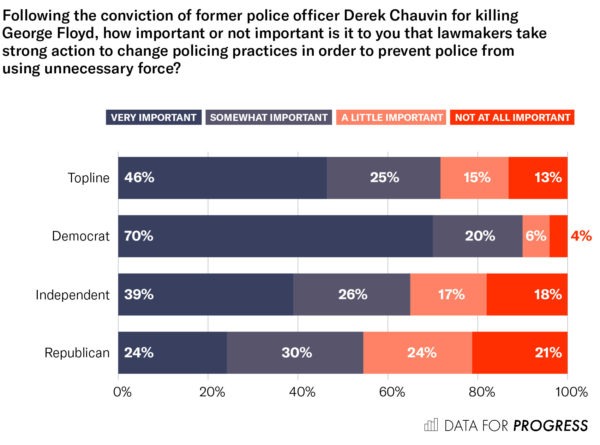
On Capitol Hill, lawmakers are negotiating competing police reform legislation. The George Floyd Justice in Policing Act, which would ban chokeholds by federal police, the use of no-knock warrants in drug-related cases, and end qualified immunity—a legal doctrine that prohibits victims from bringing civil suits against the police except in the most egregious circumstances—passed the House in early March. Our polling shows public support for ending qualified immunity, but also that voters want lawmakers to go further, moving beyond reforms to police tactics to focus on systemic changes that will limit the scope of law enforcement and the opportunities for unnecessary force.
One of the most popular proposals is for local governments to provide trained first responders, such as health care workers, instead of police officers in situations involving a mental or behavioral health crisis.
- 70% of respondents in our poll (including 84% of Democrats, 69% of independents, and 56% of Republicans) said they supported federal grants to establish programs that would replace armed police with trained experts in such emergencies.
- 58% of likely voters (including 76% of Democrats, 55% of independents, and 40% of Republicans) said they were more likely to vote for a candidate who embraced funding non-police first responder agencies to deal with issues related to substance use or mental illness.
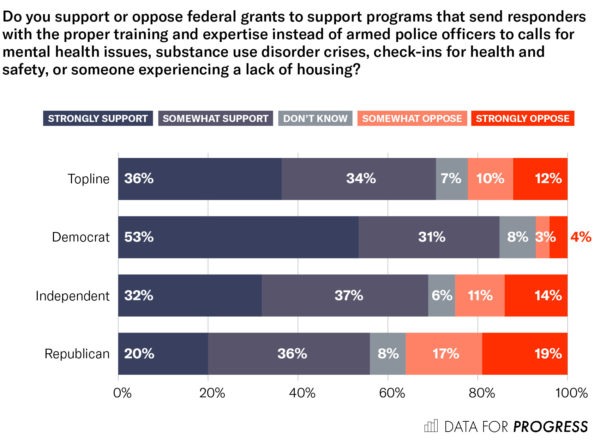
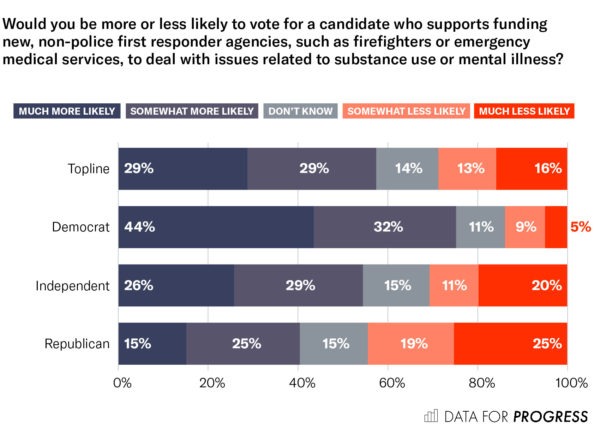
Voters also expressed support for a similar proposal to replace police with community-based programs that train local leaders to respond to and de-escalate potentially violent situations. 55% of respondents (including 74% of Democrats, 48% of independents, and 39% of Republicans) said they would be more likely to vote for a candidate who backs funding and supporting non-police community intervention programs.
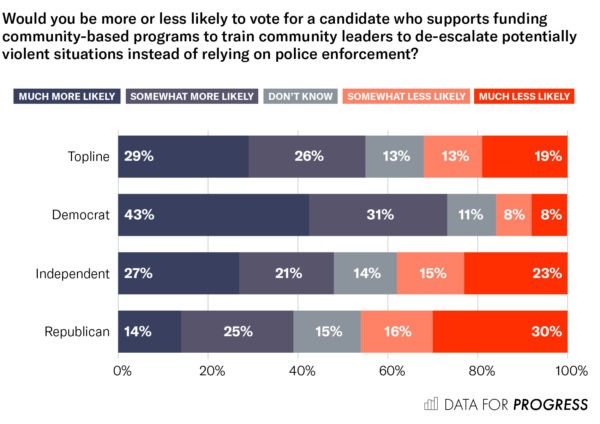
The poll also shows support for federal policies to increase police accountability and transparency. One impasse in negotiations over police reform legislation is the issue of qualified immunity. The U.S. Supreme Court created the legal defense that protects police officers from civil liability for constitutional violations in 1967, and the Court has expanded the scope of its protections over the years. As a result, it has become nearly impossible for victims of police violence to recover damages in federal court.
Over the last year, demands for accountability have led to change at the state and local level, with jurisdictions like Colorado, New Mexico, Connecticut, and Massachusetts, as well as the New York City Council, ensuring that their courthouse doors are open to people who are brutalized by police in violation of state and local protections. Our polling shows that voters support abolishing the Court-created federal immunity as well.
- In our polling, 56% of likely voters (including 73% of Democrats, 55% of independents, and 39% of Republicans) want to end qualified immunity.
- 59% of respondents (including 76% of Democrats, 58% of independents, and 39% of Republicans) said that they were more likely to vote for a candidate who supported eliminating the doctrine.
Under the rule known as “qualified immunity,” police officers are mostly immune from civil suits and victims of violence often cannot recover damages in court. Qualified immunity protects officers who violate the Constitution except in the most extreme cases, such as when officers are “plainly incompetent” or “knowingly break the law.” Supporting an end to qualified immunity means that police officers could be sued for violating people’s constitutional and other civil rights, including when police officers kill. Opposing an end to qualified immunity means leaving the law as it currently is, protecting police officers from civil liability in most cases.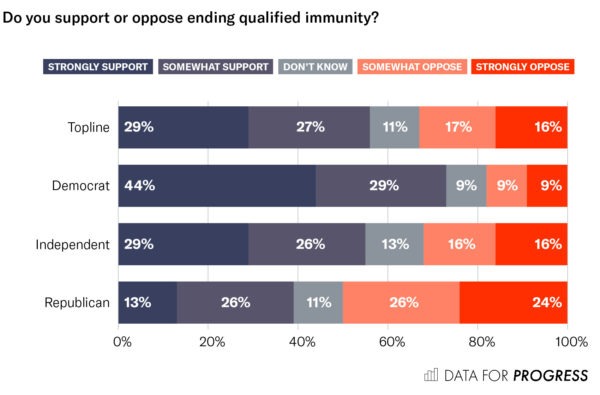
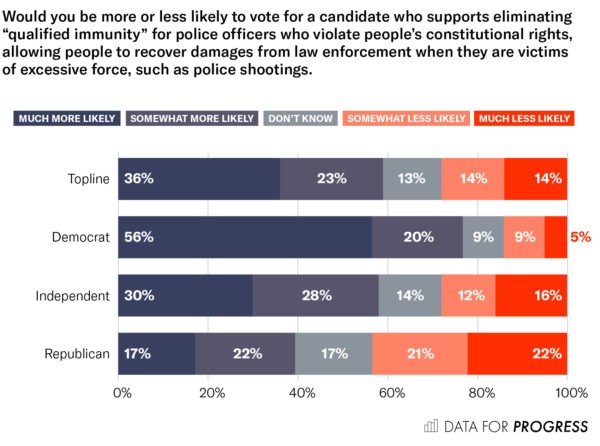
Voters also support a more transparent and cohesive accountability mechanism for officers who have a history of misconduct, with 67% (including 79% of Democrats, 70% of independents, and 53% of Republicans) indicating they would be more likely to vote for a candidate who approves of a nationwide police misconduct registry.
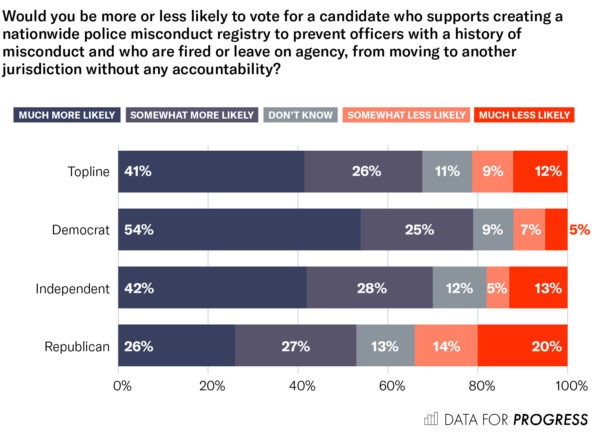
Polling Methodology
From April 23 to 25, 2021, Data for Progress conducted a survey of 1,189 likely voters nationally using web panel respondents. The sample was weighted to be representative of likely voters by age, gender, education, race, and voting history. The survey was conducted in English. The margin of error is ±3 percentage points.

